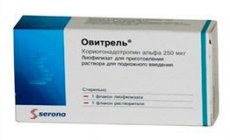Medical expert of the article
New publications
Preparations
Ovitrel
Last reviewed: 23.04.2024

All iLive content is medically reviewed or fact checked to ensure as much factual accuracy as possible.
We have strict sourcing guidelines and only link to reputable media sites, academic research institutions and, whenever possible, medically peer reviewed studies. Note that the numbers in parentheses ([1], [2], etc.) are clickable links to these studies.
If you feel that any of our content is inaccurate, out-of-date, or otherwise questionable, please select it and press Ctrl + Enter.

Indications Ovitrel
Ovitrel is intended to treat infertility in women due to ovarian hypofunction or problems with natural ovulation. The drug is used for in vitro fertilization, and is also used to prepare the body for in vitro fertilization (IVF) - for the purpose of the final maturation of follicles after follicle-stimulating therapy.

Pharmacodynamics
Gonadotropic action Ovitrel - the initiation of ovulation - is provided by the recombinant hormone choriogonadotropin α, which is an analogue of endogenous human chorionic gonadotropin (hCG), synthesized by the placenta during pregnancy and having high luteinizing activity.
Linking to the receptors of luteinizing hormone (LH) on the cytoplasmic membranes of glycoproteins surrounding the ovarian follicles and basal membranes of the cell-cells, alpha-chorioradotropin induces the onset of the reduction division of the oocyte and ovulation (release of the oocyte from the follicle). In addition, from the granulosa cells of the follicle begins to form a yellow body of the ovary, which produces a large amount of progesterone.
Pharmacokinetics
After the administration of the drug under the skin, alpha-choriogonadotropin is absorbed into the extracellular fluid and enters the bloodstream, the bioavailability does not exceed 40%. The half-life of Ovitel is about 30 hours.
 [10]
[10]
Dosing and administration
Ovitrel is used only in conditions of specialized medical institutions by physicians of the appropriate qualification.
Ovitrel is administered by subcutaneous injection (0.25 mg) according to a specific scheme that corresponds to the goal pursued. The use of this drug involves the preliminary administration of hormonal drugs based on menopausal gonadotropin or follicle-stimulating hormone.
Use Ovitrel during pregnancy
Ovitrel during pregnancy is not used.
Contraindications
Ovitrel is contraindicated for:
- tumor formations of the pituitary or hypothalamus;
- hypertrophy and cystic ovarian disease;
- fibrotic hyperplasia in the uterus;
- malignant epithelial tumors (carcinomas) of the ovaries, uterus or mammary glands;
- uterine bleeding;
- cardiovascular pathologies (thrombosis, embolism).
Side effects Ovitrel
The use of ovitrel may be accompanied by side effects such as headache, nausea, vomiting, diarrhea or constipation, decreased blood pressure, mastalgia (pain in the mammary glands), decreased urine production (oliguria), pain and a feeling of heaviness in the abdomen, thromboembolism, skin rashes , Quincke's edema, sleep and mood disorders.
 [13]
[13]
Overdose
Ovitrel can lead to ovarian hyperstimulation - an increase in the size of the ovaries with the risk of their twisting and rupturing.
 [16]
[16]
Interactions with other drugs
Ovitrel does not affect the effects of other drugs. According to the manufacturer, within a week after using this drug, a pregnancy test can be erroneously positive.
 [17]
[17]
Storage conditions
In sealed packages, the drug should be stored at + 15-25 ° C; a bottle of powder in printed form - at a temperature of + 2-8 ° C for a maximum of 30 days; the drug in the unpacked syringe is not subject to storage.

Shelf life
Shelf life - 24 months.
Attention!
To simplify the perception of information, this instruction for use of the drug "Ovitrel" translated and presented in a special form on the basis of the official instructions for medical use of the drug. Before use read the annotation that came directly to medicines.
Description provided for informational purposes and is not a guide to self-healing. The need for this drug, the purpose of the treatment regimen, methods and dose of the drug is determined solely by the attending physician. Self-medication is dangerous for your health.

